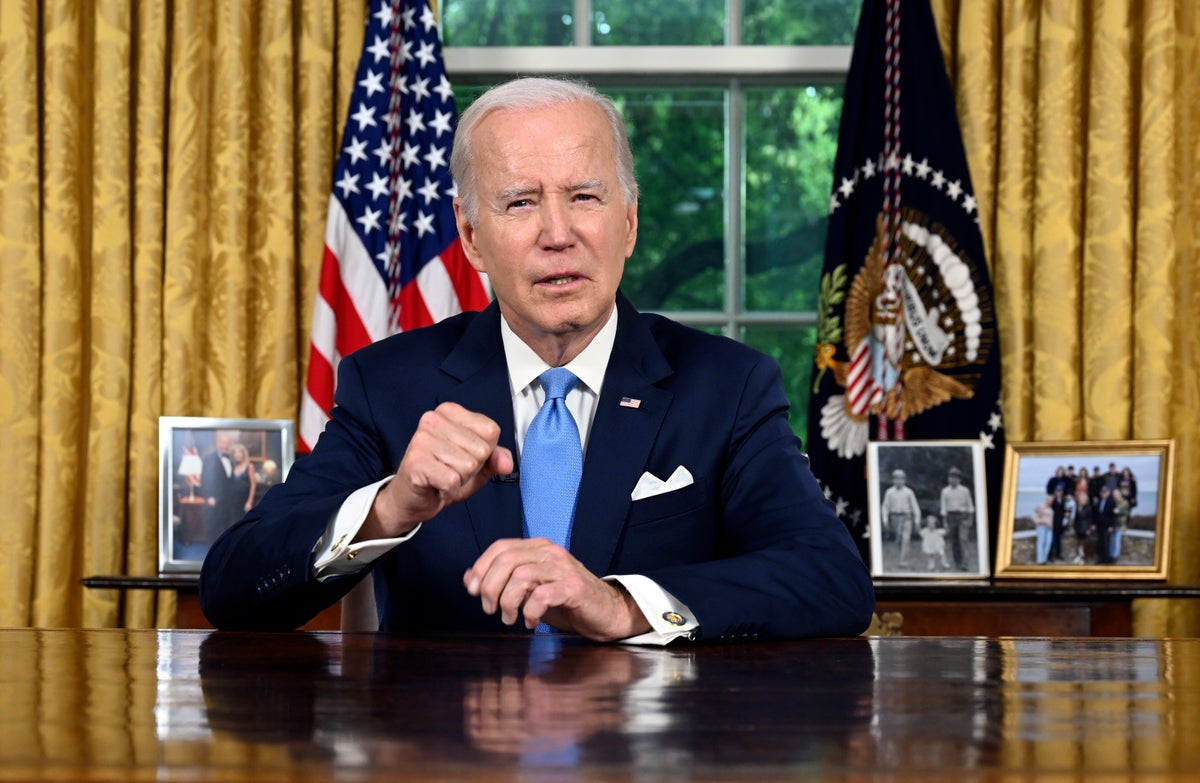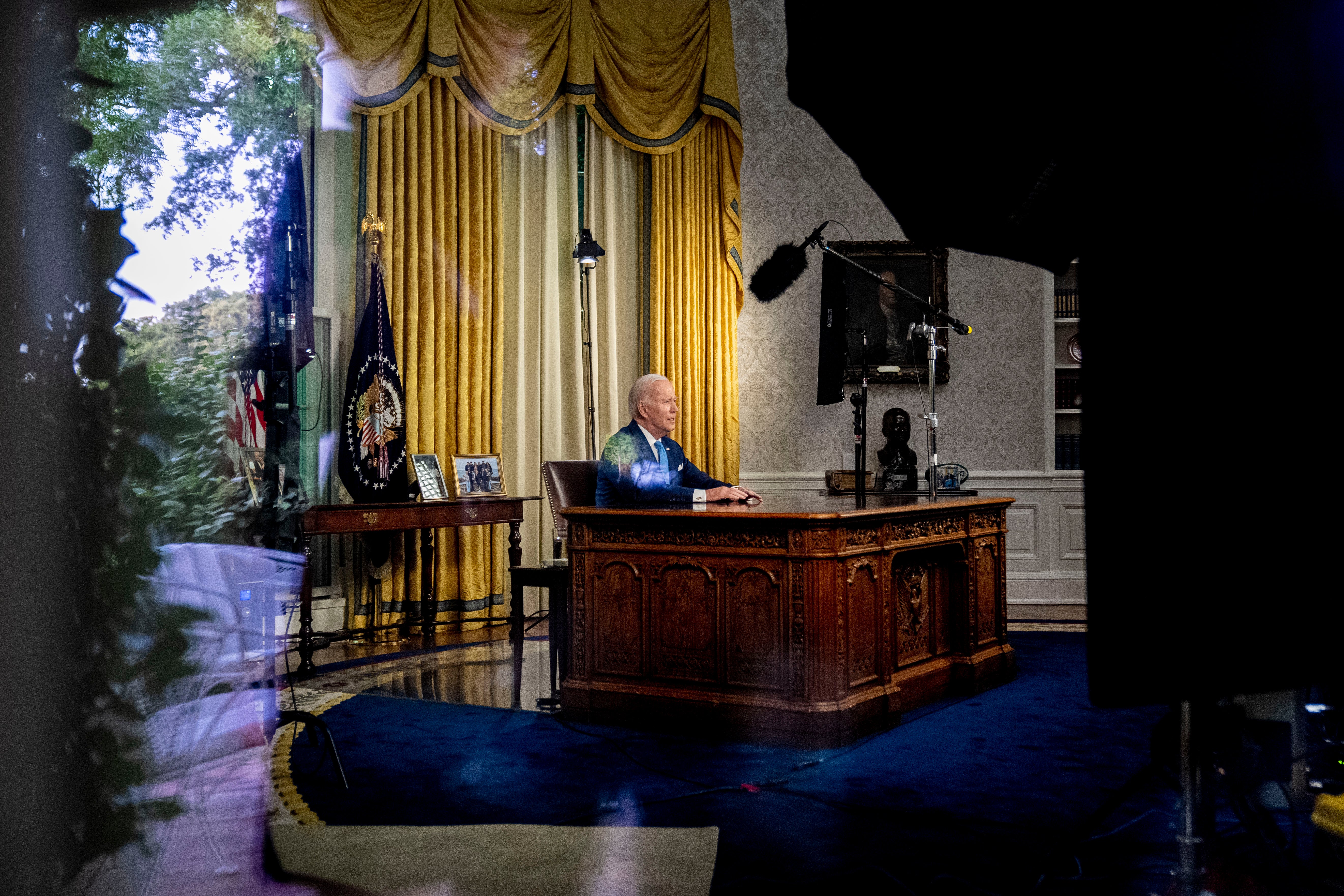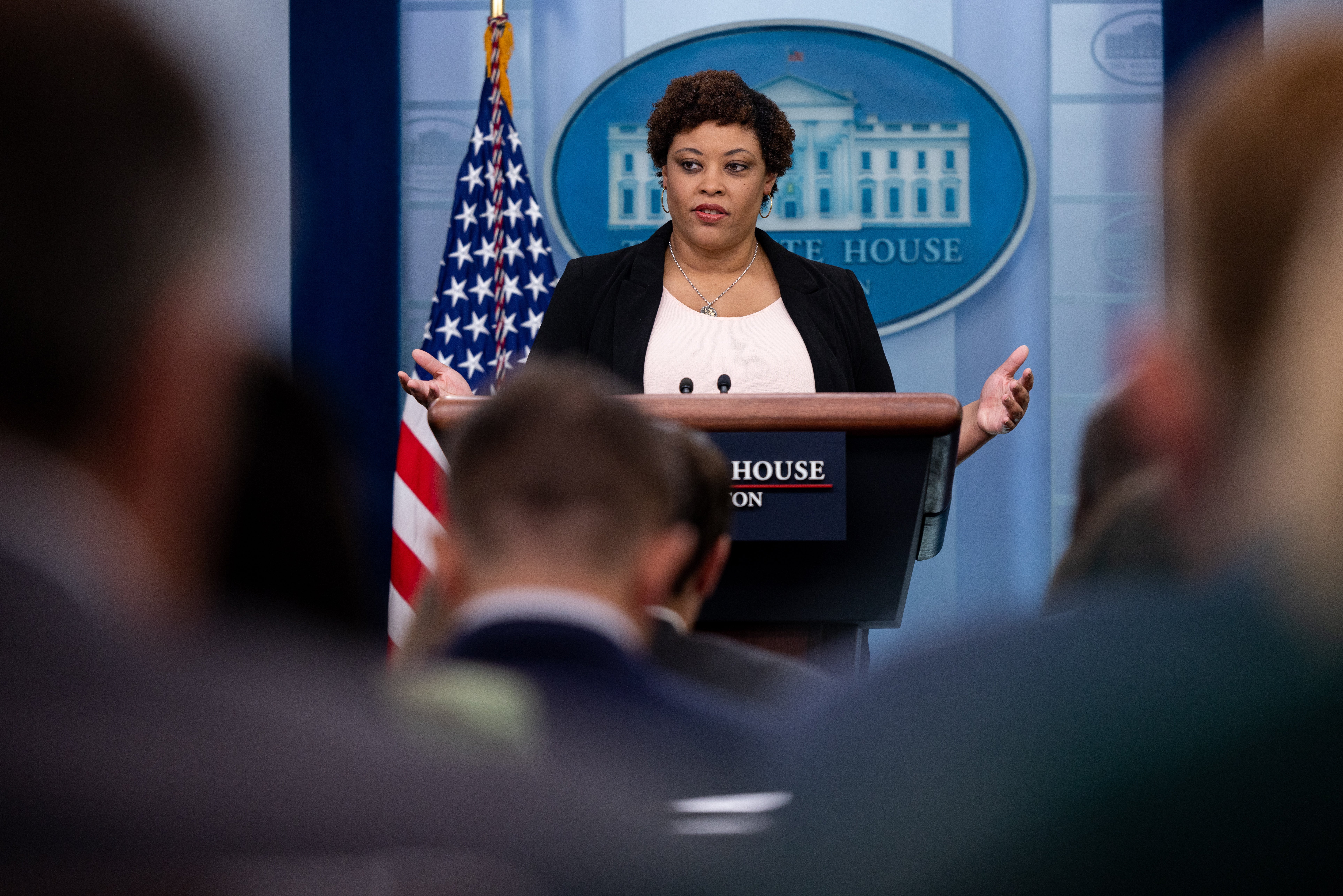
President Joe Biden on Friday urged Americans not to give up on working across the political aisle to solve national problems as he hailed the bipartisan legislation passed by Congress to stave off a catastrophic default on the nation’s sovereign debt as a good compromise that will protect the economic progress of the past two years.
Speaking from the Oval Office during the prime-time television viewing hours — the first time he has addressed the nation from behind the iconic desk hewed from timbers taken from HMS Resolute — Mr Biden said he’d chosen to speak to the American people that night to “report on a crisis averted” and explain what his administration and Congress “are doing to protect America’s future” by enacting the spending agreement negotiated between his aides and top House Republicans.
The president said he would sign the legislation on Saturday.
“Passing this budget agreement was critical. The stakes could not have been higher,” he said, just moments after he told Americans that the goals of the agreement — “keeping the full, faith, and credit of the United States” and enacting “a budget that continues to grow our economy and reflects our values as a nation” – are “essential” to continuing the progress made during the first two years of his presidency.
The president said “nothing” would have been more irresponsible or catastrophic than a failure by the US to pay its bills and laid out the dire consequences that a default would’ve brought on Americans of all stripes.
“Our economy would have been thrown in recession. Retirement accounts for millions of Americans would have been decimated, eight million Americans would have lost their jobs. Default would have destroyed our nation’s credit rating, which would have made everything from mortgages to car loans to funding for the government much more expensive and it would have taken years to climb out of that hole — and America standing as the most trusted, reliable financial partner in the world would have been shattered,” he said.
While Mr Biden said it was “critical” to reach the agreement he will sign into law and called it “good news for the American people,” he also stressed the necessity of compromise given the realities of Republican control of the House of Representatives and the thin one-seat majority by which his own party controls the Senate, as well as the importance of provisions in the bill that will ensure key social programmes will receive full funding in the next two years.
“No one got everything they wanted but the American people got what they needed. We averted an economic crisis and an economic collapse,” he said. “We’re cutting spending and bringing deficits down. And, we protected important priorities from Social Security to Medicare to Medicaid to veterans to our transformational investments in infrastructure and clean energy.”
He also touted the fact that the agreement preserved legislation like the PACT Act– which extends veteran benefits to service members who suffered health complications from burn pits – and the Inflation Reduction Act, as well as the CHIPS and Science Act, which promotes manufacturing of semiconductors in the United States.
“Remember at the beginning of this debate, some of my Republican colleagues are determined to get the clean energy investments,” he said. “I said no, we kept them all.”
Mr Biden’s remarks came less than 24 hours after the Senate approved the compromise bill by a margin of 63-36, and just over two days after the House of Representatives voted to advance the legislation. They represent the most extensive public comments the president has made on the now-resolved crisis after weeks of silence from the White House.

Many in the president’s own party had criticised his reluctance to inject himself into the public discourse surrounding the negotiations. But a source close to the White House end of the process told The Independent on Thursday that Mr Biden’s silence was a deliberate choice, made out of necessity to avoid inflaming Republicans who would need to vote for the legislation to avert what most experts say would have been a worldwide economic disaster brought on by a US debt default.
In the end, Mr Biden’s strategy proved successful in preventing Republican opposition from sinking the 11th-hour deal to save the US and world economies, and the White House was able to cajole all but a limited number of Democrats to give their support as well.
Of the 51 members of the Senate Democratic caucus, just five joined 31 Republicans in opposition to the measure, which will suspend the nation’s statutory debt limit through the entirety of the 2024 election cycle while implementing limited spending cuts sought by the GOP and enacting some work requirements for non-disabled adults without children between the ages of 50 and 54 to access the Supplemental Nutrition Assistance Program, otherwise known as SNAP and formerly known as food stamps.
A number of arch-conservatives in the House of Representatives had criticised the bill as giving away far too much to the White House, and in the end 71 members of the GOP conference voted against it, necessitating Democrats to contribute enough support to pass the GOP-controlled chamber.
The bipartisan legislation, which was unveiled earlier this week following marathon negotiations between the White House and the Republican-led House of Representatives, will be signed into law with just two days remaining before the 5 June “X Date,” the day on which Treasury Secretary Janet Yellen had projected that the government would exhaust its ability to pay its outstanding debt obligations absent intervention from Congress.
The spending and debt ceiling deal is the first major bipartisan agreement between the White House and the House since Mr McCarthy was elected Speaker after a record 15 ballots in January.
The president had for months pledged not to negotiate while the GOP held out the possibility of a default as leverage to force him to endorse rolling back much of the legislative accomplishments enacted during his first two years in office, while Mr McCarthy had committed not to allow any bill that would lift the debt limit to move through his chamber absent concessions from the White House.
The impasse persisted for months until Mr Biden extended an invitation to Mr McCarthy after the House passed what the GOP dubbed the “Limit, Save, Grow Act” — a bill to lift the debt ceiling and enact massive cuts to government programmes.
Negotiations kicked into high gear late last month after the president tapped Shalanda Young, the director of the Office of Management and Budget, and Counsellor to the President Steve Ricchetti — one of his longest-serving and most trusted aides — to engage with two GOP House members chosen by Mr McCarthy, House Financial Services Committee Chair Patrick McHenry and Louisiana Representative Garret Graves.

The president praised House Speaker Kevin McCarthy, as well as Senate Majority Leader Chuck Schumer, Senate Minority Leader Mitch McConnell and House Minority Leader Hakeem Jeffries for undertaking good-faith efforts to move the bill through their respective chambers with deliberate speed.
“They acted responsibly and put the good of the country ahead of politics,” he said. “A final vote in both chambers was overwhelming.”
He closed his address by emphasizing unity and the importance of “see[ing] each other’s not as adversaries but as fellow Americans” and “treat[ing] each other with dignity and respect” as a way to “lower the temperature” so both parties can “work together ... to pursue progress, secure prosperity and keep the promise of America for everybody”.
“I know bipartisanship is hard, and unity is hard, but we can never stop trying because in moments like this one, the ones we just faced, where the American economy in the world economy is at risk of collapsing,” he said. “There’s no other way.
With reporting from Andrew Feinberg in New Hampshire and from Eric Garcia in Washington







